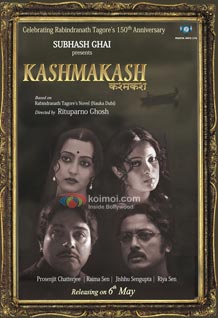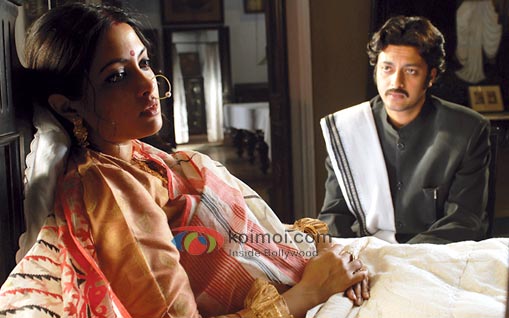 Business rating: 1/5 star
Business rating: 1/5 star
Star cast: Jishu Sengupta, Raima Sen, Riya Sen, Prosenjit Chatterjee.
What’s Good: The performances; the authentic atmosphere of the 1920s’ Bengal.
What’s Bad: The slow pace of the drama; the lack of identification with the subject in today’s Internet age; too many coincidences in the screenplay.
Verdict: Kashmakash will bomb at the box-office, never mind the critical acclaim it gathers.
Loo break: Not really.
Watch or not?: Watch it if you are a fan of Rituparno Ghosh’s cinema.
Mukta Searchlight Films’ Kashmakash (dubbed from the Bengali film, Nouka Dubi) is based on Rabindranath Tagore’s short story, Nouka Dubi. It is a period film set in the 1920s.
Ramesh (Jishu Sengupta), a law student in Calcutta, is in love with his friend’s sister, Hemnalini (Raima Sen), but he is forced to marry Susheela, daughter of a hapless widow, in his village. After marriage, Ramesh sets out with his bride on a river boat journey back to Calcutta. A fierce storm overturns the boat and Ramesh comes to his senses on a deserted shore. He sees an unconscious bride and takes her to be his Susheela. There’s nobody else in sight, alive or dead. Susheela is wondering why her husband is not taking her to Kashi but she remains quiet.
Hemnalini knows nothing of Ramesh’s marriage. Back in Ramesh’s home in Calcutta, the facts of mistaken identity gradually come to light. Ramesh realises that the lady he has brought home is Kamla, not his Susheela, and that her husband is a doctor named Nalinaksha Chatterjee. He issues an advertisement in a newspaper to find the whereabouts of Nalinaksha but does not have the heart to tell Kamla about the truth. He sends her to a school, so she can learn to read and write. Soon, Hemnalini’s would-be suitor, Akshay, learns about Ramesh’s marriage and brings proof of it to Hemnalini. Unable to reveal the truth about his forced marriage and death of his wife, Ramesh leaves Calcutta and goes away to Gorakhpur with Kamla. He understands, it would now not be possible for him to marry Hemnalini.
Hemnalini, of course, is devastated and she is brought by her loving father to Kashi so that she can forget about Ramesh. In Kashi, Hemnalini meets Nalinaksha (Prosenjit Chatterjee) and they fall in love. Meanwhile, Kamla learns of the truth about Ramesh not being her husband and attempts suicide but she is rescued by a courtesan and deposited in Kashi under the care of Nalinaksha’s mother. Kamla sees her husband but cannot speak up as he is to get married to Hemnalini.
What happens thereafter? Does Hemnalini marry Nalinaksha or does Kamla unite with her husband? Does Ramesh ever trace Nalinaksha? Does Ramesh get Hemnalini?

Kashmakash Review – Script Analysis
The film has a very interesting story and keeps the audience engaged even though it appears a bit strange in today’s time and age of mobile phones, Internet etc. Also, there appear to be too many coincidences in the drama. Rituparno Ghosh’s screenplay remains true to the story but again, its slow pace will not go down too well with the masses. So, in totality, the film remains of interest to the thin minority called the elite. Dialogues are engaging.
Kashmakash Review – Performances & Direction
Jishu Sengupta gives a restrained account of himself. Raima Sen is endearing. Riya Sen exudes the right amount of innocence. Her dubbing (not in her voice) is excellent. Prosenjit Chatterjee does justice to his role and comes up with a winning performance. He looks a bit unshapely, though. Dhritiman Chatterjee is splendid. Apratim Dhar, Sumanta Mukherjee, Sagar Mukherjee, Ammu Chatterjee and Maria Chatterjee lend able support.
Rituparno Ghosh’s direction is sensitive and very class-appealing. Music (by Raja Narayan Deb and Sanjoy Das) is melancholic and Gulzar’s lyrics are very meaningful. Soumik Halder’s cinematography is beautiful. Editing (Arghyakamal Mitra) remains true to the subject. Dubbing is very nice.
Kashmakash Review – Komal Nahta’s Verdict
On the whole, Kashmakash will win critical acclaim but its box-office prospects are bleak because it has not been promoted well enough and also because the film belongs to an era which may not hold interest for today’s audience.



 Follow Us
Follow Us







